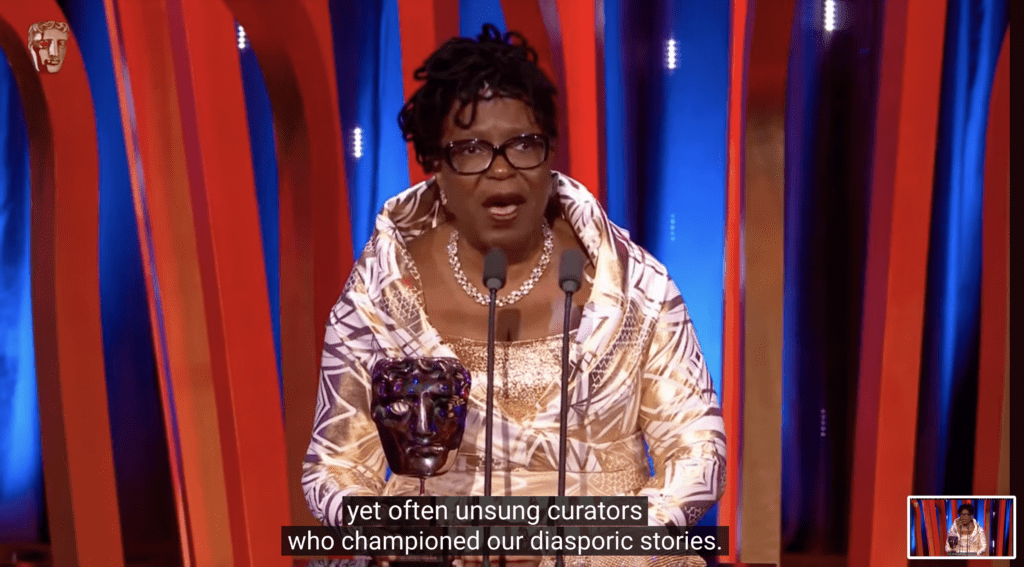“You are an archive”: June Givanni’s ‘Outstanding Contribution to Cinema’
by Alexa Efune (NYU Cinema Studies)
On February 18th, the British Academy Film Awards (BAFTA) duly endowed long-time Black film archivist and programmer June Givanni with BAFTA’s “Outstanding British Contribution to Cinema” award. The award marks the first official recognition of Givanni’s critical archival work by an English film institution.
Givanni’s labor collecting, preserving, studying, and exhibiting material relating to Black British and Afro-Diasporic cinema dates back over 40 years. In 1981, Givanni assisted in executing the Third Eye World Cinema Film Festival in London. At the end of the 1980s, Givanni founded the British Film Institute (BFI) African-Caribbean film unit, and subsequently headed and edited Black Film Bulletin, BFI’s magazine focused on Black and Pan-African cinema. During her time as a programmer and editor at BFI, Givanni began collecting VHS, DVDs, cassettes, artworks, books, and other material relating to Black cinema that would have otherwise likely been discarded. Over the decades, Givanni accumulated and preserved over 10,000 pieces of pan-African and Black British film materials, eventually establishing her collection as the June Givanni Pan-African Cinema Archive (‘JGPACA’). The archive was self- and crowd- funded, and is volunteer-run by Givanni and a small team of British archivists.
In conversation with a BAFTA member, Givanni spoke on the importance of archivists: “You are an archive, because you know where all the bodies are buried, you know where all the links are between things, both geographical and historical. And it’s the links that make things significant.” Large institutional archives, such as BFI’s national film archive, are critical in preserving and upholding cinematic history. However, individual archivists working with collections directly related to their lives — socially, culturally, historically — will always hold a special relationship with the materials. With decades of experience in the Black and African cinematic circuit, Givanni doesn’t merely know how to preserve and catalog the material she collects. She knows the historical context and understands how the significance of these objects changes over time. Her personal connections with the materials and, often, the filmmakers themselves, allow the objects to maintain their historical value instead of becoming lost and diluted in a larger archive.
If the majority group(s) control(s) access to all of our visual histories, they control collective memory and yield the power to rewrite it if deemed necessary. Givanni’s legacy is vital to all film scholars, critics, preservationists, archivists, anarchivists, liberation fighters, and historians to divulge that the path to alternative archiving and decolonizing film history is well within reach of cultural workers. BAFTA awarding Givanni the Outstanding Contribution prize is a meaningful symbolic recognition of the future of film archiving, but the award itself pales in comparison to Givanni’s insurmountable achievements in upholding the heritage of Black British and African cinema heritage.

Essays and interviews
- June Givanni, “A Curator’s Conundrum: Programming “Black Film” in 1980s-1990s Britain,” The Moving Image 4.1 (Spring 2004): 60-75.
- Michael T. Martin, “The Practice of Curating the June Givanni Pan African Cinema Archive: A Conversation with the Founding Director.” Black Camera 11.1 (2019): 40-61.
- “Curating the June Givanni Pan-African Cinema Archive: June Givanni in Conversation with Charlotte Brunsdon [2018],” Journal of British Cinema and Television18.3 (2021).
- Aditi Jaganathan, Sarita Malik, and June Givanni, “June Givanni’s Pan-African Cinema Archive: A Diasporic Feminist Dwelling Space.” Feminist Review 125.1 (2020): 94–109.
- “Archivist, Editor, Pioneer: June Givanni In Conversation With Sarita Malik,” Sight and Sound, May 2023, 30-33.
- June Givanni, “Symbolic Narratives/African Cinema : Audiences, Theory and the Moving Image,” Symbolic Narratives/African Cinema: Audiences, Theory and the Moving Image (BFI, 2000).
